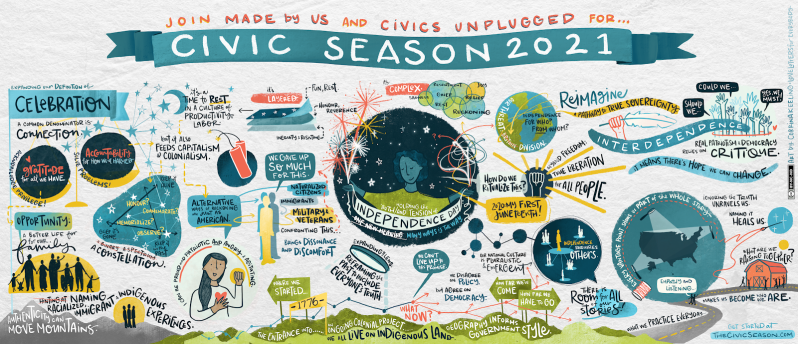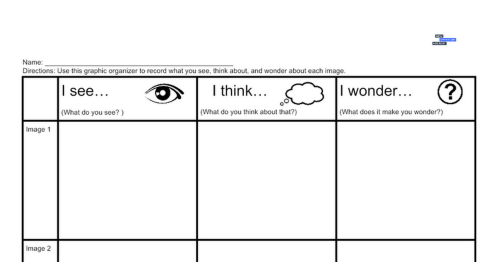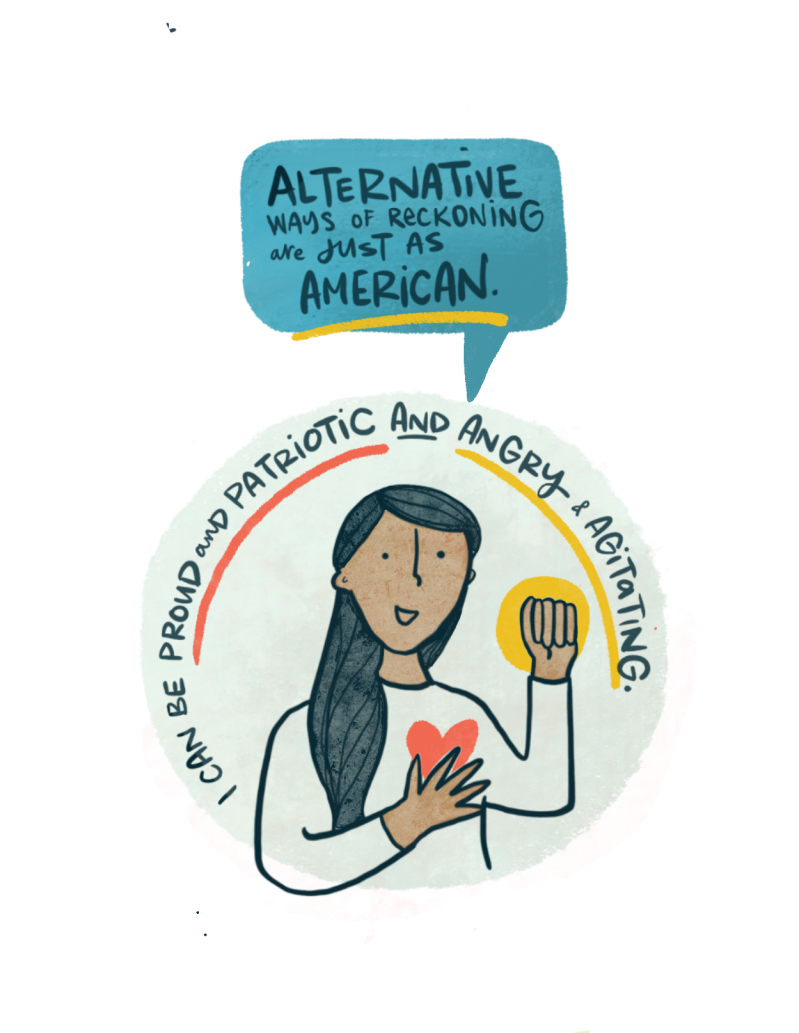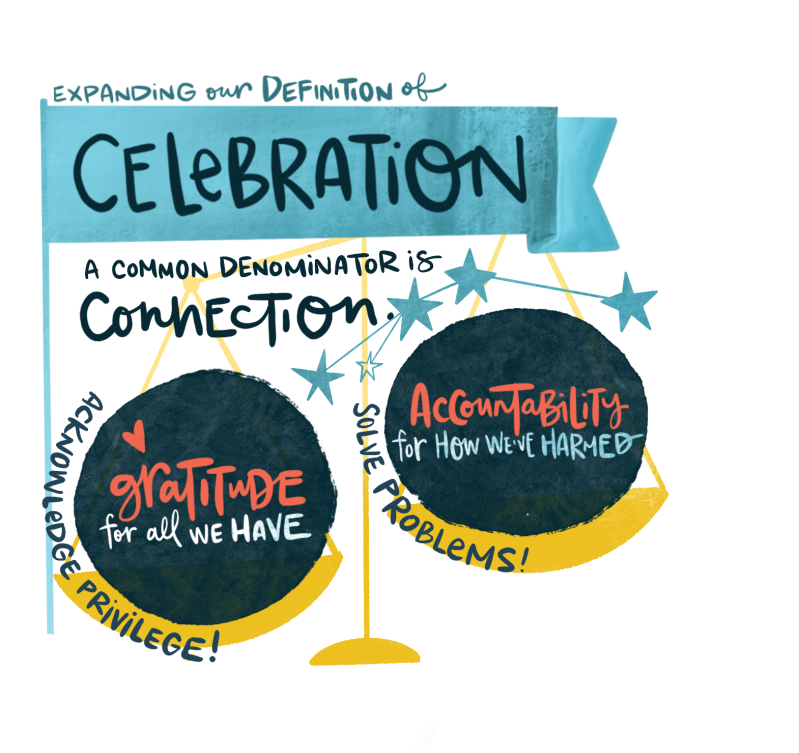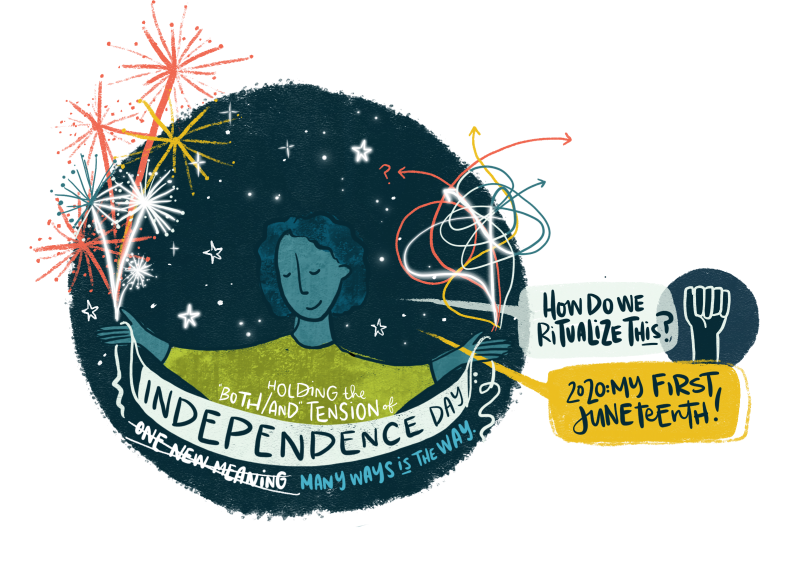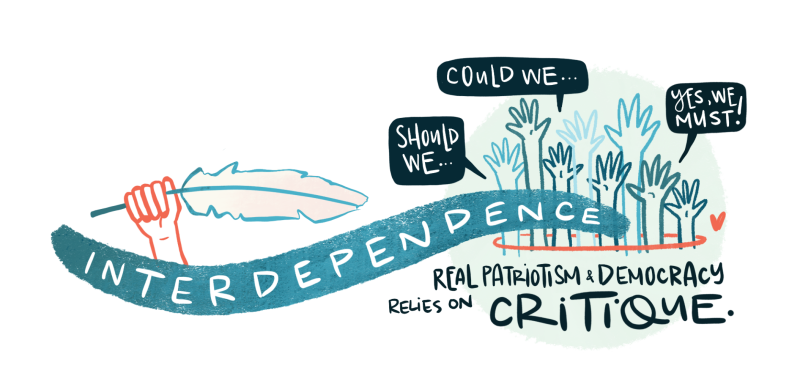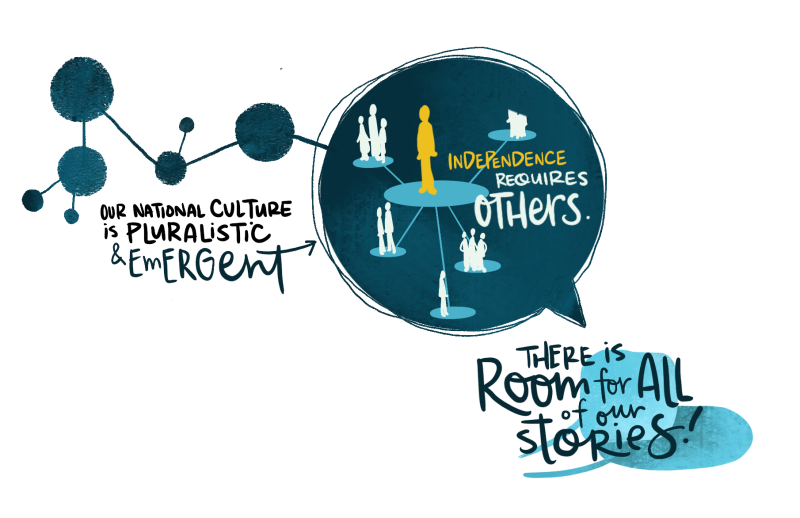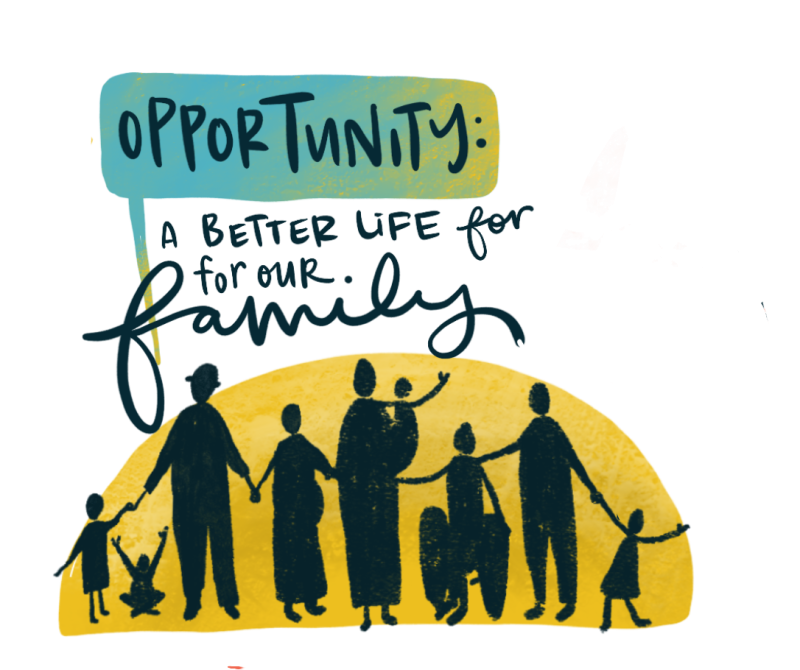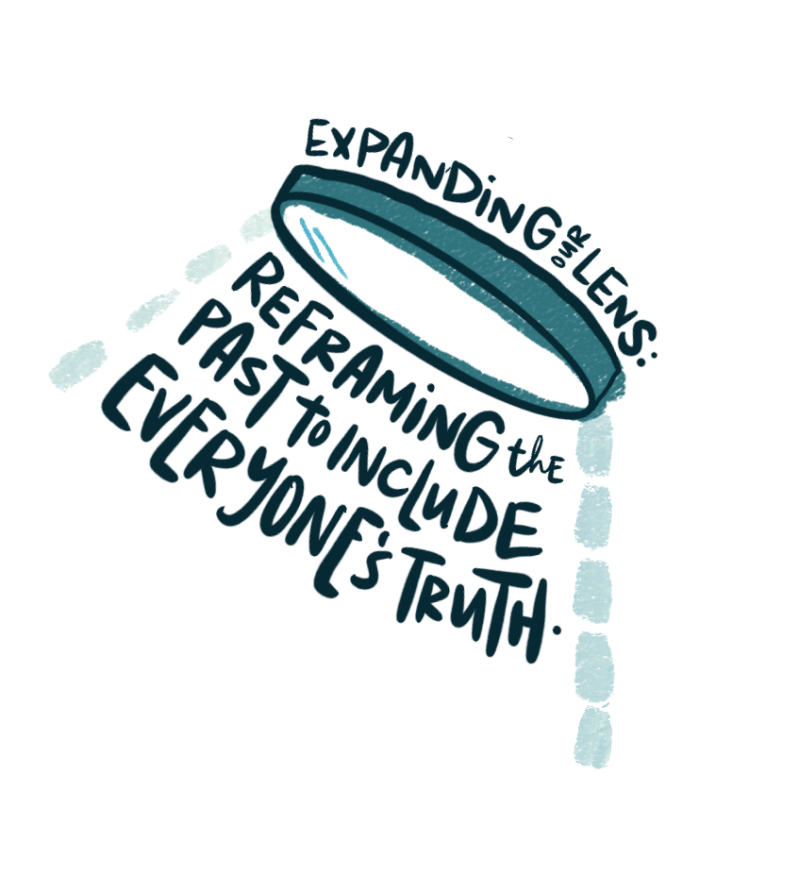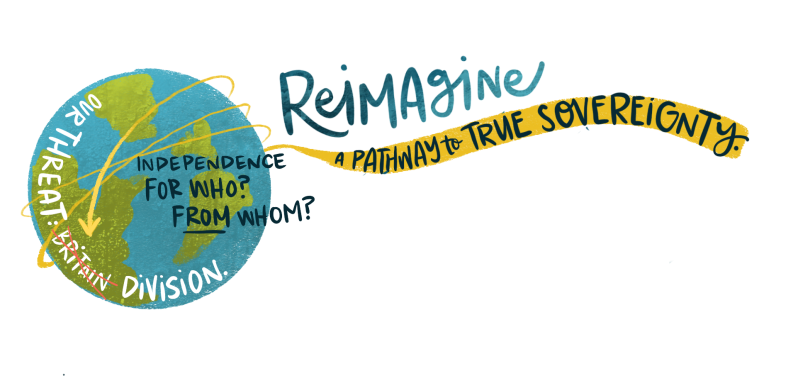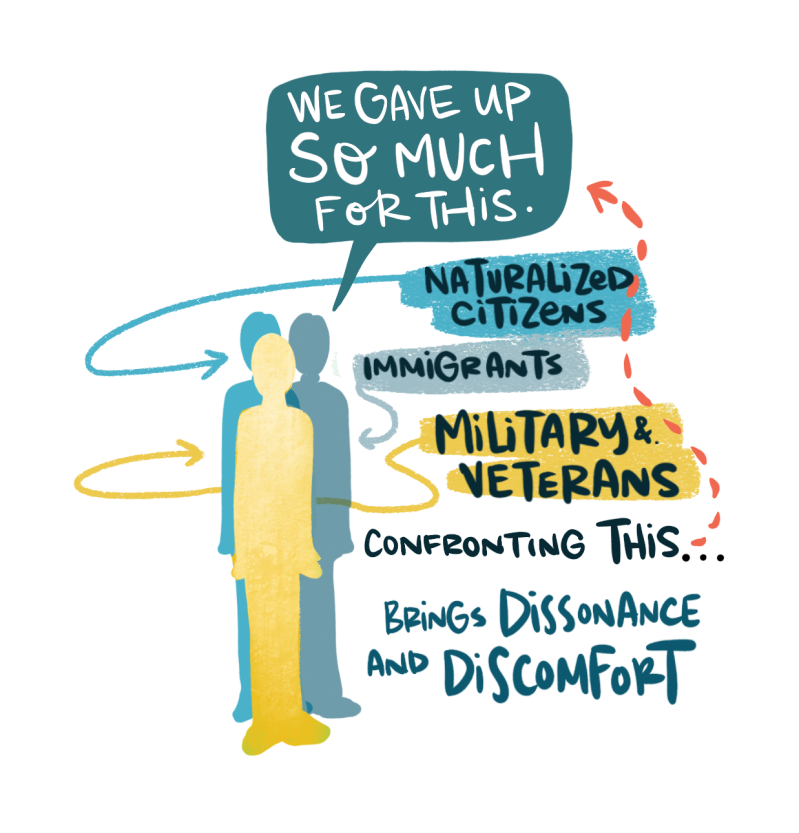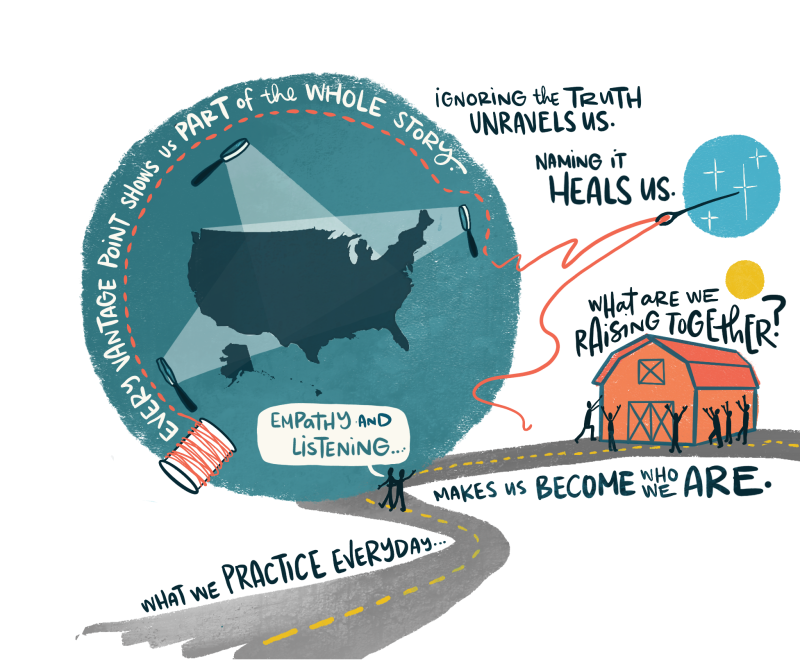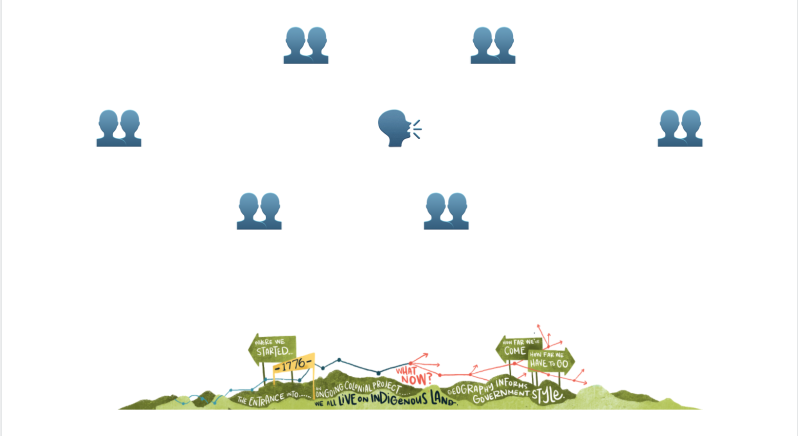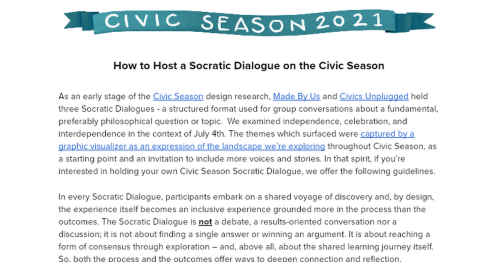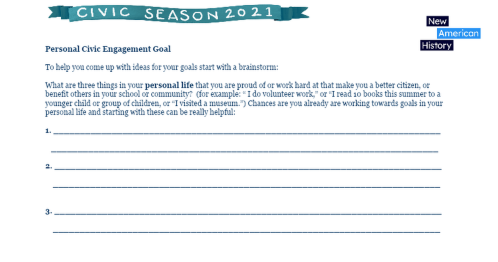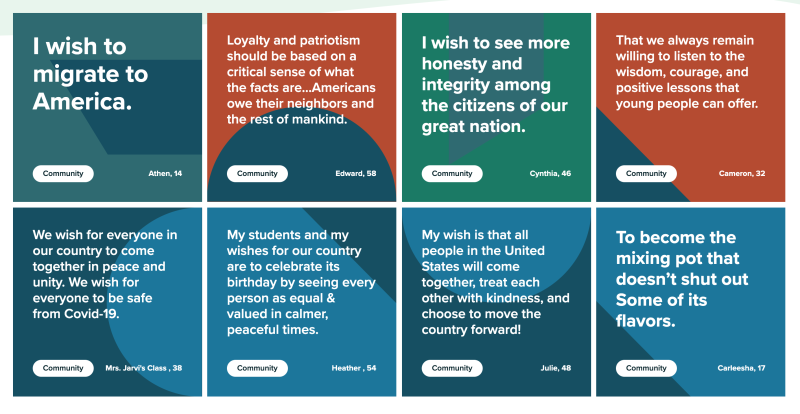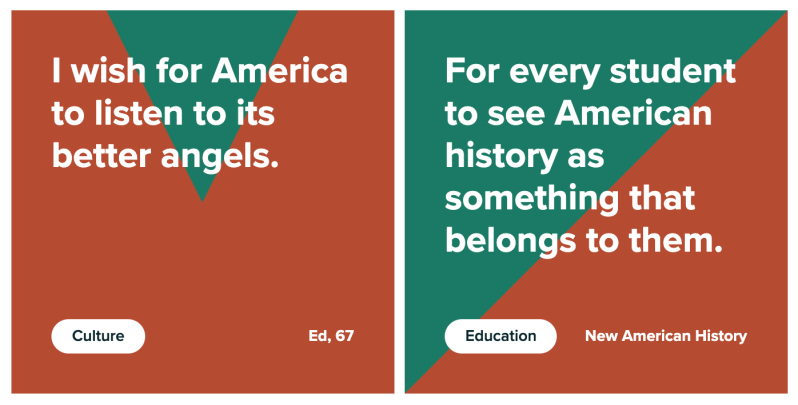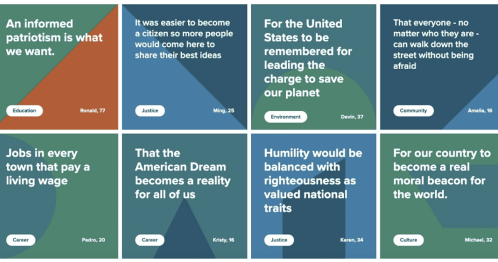This work by New American History is licensed under a Attribution-NonCommercial-ShareAlike 4.0 (CC BY-NC-SA 4.0) International License. Permissions beyond the scope of this license may be available at newamericanhistory.org.
The Civic Season 2021
Read for Understanding
The first-ever Civic Season from our friends at Made by Us and Civics Unplugged is about expanding the lens: making space for more stories from the past, more voices from the present, and more input on what an annual tradition for civic participation could look like. When the Civic Season kicks off in June 2021, you can explore a multitude of offerings and activities filtered by topic, location, and format, designed to support your own personal exploration into history and democracy. What role will you play?
Key Vocabulary
Civic - having to do with citizens or citizenship; engaged in a local community
Critique - a discussion or written evaluation of a work of art or literature
Interdependence - relying on one another, connections to people or the environment to meet basic needs
Juneteenth - the anniversary and celebration of the day, June 19, 1865, on which the end of slavery was announced in Texas by Union forces, is now celebrated nationwide in commemoration of the true end of slavery in the United States.
Social spaces - a physical or virtual space such as a social center, online social media, or other gathering places where people gather and interact. Some social spaces such as town squares, some museums, and historical sites or parks are public places; others such as some museums and historical sites, websites, or shopping malls are privately owned and regulated or charge a fee for access.
Socratic Dialogues - a structured format used for group conversations about a fundamental, preferably philosophical, question or topic.
Reimagine - to think about something in a new way, to explore new possibilities, solutions, or routines
Engage:
What role might we all play in engaging in the Civic Season?
The first-ever Civic Season from our friends at Made by Us and Civics Unplugged is about expanding the lens: making space for more stories from the past, more voices from the present, and more input on what an annual tradition for civic participation could look like. When the Civic Season kicks off in June 2021, you can explore a multitude of offerings and activities filtered by topic, location, and format, designed to support your own personal exploration into history and democracy. What role will you play?
As an early stage of the Civic Season design research, Made By Us and Civics Unplugged held three Socratic Dialogues - a structured format used for group conversations about a fundamental, preferably philosophical question or topic. Partner organizations like New American History examined independence, celebration, and interdependence in the context of July 4th. The themes which surfaced were captured by a graphic visualizer as an expression of the landscape we’re exploring throughout Civic Season, as a starting point and an invitation to include more voices and stories. Take some time to explore the graphic visualizer by artist Corrina Keeling. Your teacher may ask you to record your thoughts using this See Think Wonder graphic organizer.
- What do you see?
- What does it make you think about?
- What do you still wonder?
- Which image or images made you think differently about how you engage with history or civics?
- How would you describe the artist’s use of words and images as a storytelling tool?
- What new ideas would you like to add to this graphic visualizer?
Your teacher may ask you to record your answers on a graphic organizer or an exit ticket.
Explore:
How might we think differently about how we create and explore social spaces?
The 4th of July commemorates the moment when a new generation boldly articulated the values of a new nation: freedom, equality, justice, rights, and opportunity. Juneteenth, celebrated just a few weeks earlier, highlights how these values have been fought for and unevenly shared over nearly 250 years of history, and even before the United States was formed. This fundamental tension calls us all to play a part in forming “a more perfect union.” Our story is complex and evolving. But history shows it’s up to us to strengthen and sustain democracy, not only during elections but through year-round rituals of engaged citizenship.
Today, amid a groundswell of interest about America’s future, how might we imagine a new kind of tradition that goes beyond hot dogs and fireworks, to more deeply connect with our communities, our nation, and with the meaning and spirit of our founding values today?
An annual Civic Season, held between Juneteenth and the Fourth of July, mobilizes us all to connect with our past, take action in the present, and shape the future, through activations in our neighborhoods, cities, towns, and social spaces. A joint effort from leading history institutions and the next generation, the inaugural Civic Season invites everyone to join in creating this tradition. As we build towards the nation’s 250th anniversary, just 5 years away, the Civic Season reaches beyond civic responsibility, cultivating civic opportunity: chances to pitch in, take part, help write the next chapter of our history.
Take a few minutes to take a closer look at these images, components of the Civic Season graphic visualizer by artist Corrina Keeling.
Invite others to join you in safely visiting a museum, local park, or historic landmark. If social distancing or working remotely, your teacher or a trusted adult may let you explore a virtual field trip or other digital content from the Civic Season with a friend or friends via videoconferencing or using a Smartphone or other approved device. These interactive cards might be a fun way to share the Civic Season with your friends and family.
Always check first with your teacher, school or camp counselor, youth leader, or other trusted adult before safely posting your ideas to social media. If you are age 14 or younger, you may ask an adult to help you safely share your ideas.
We’d love to see what you created- share it with us via Twitter using #civicseason and be sure to tag us @newamericanhist and @historymadebyus
Your teacher may ask you to record your answers on an exit ticket.
Explain:
When we think about coming together in our local communities or as global citizens, what components of the Civic Season resonate with you?
Between the kickoff on Juneteenth and the culmination on the Fourth of July, the Civic Season will be driven forward by our partner organizations and energized by a social media campaign so individuals nationwide can find ways to join in civic engagement activities tied to their interests and communities, such as local history programs, crowdsourced media projects, and service.
Schools, faith-based organizations, scout troops, summer camps, and other youth-focused programs can participate by hosting a Socratic Dialogue. Socratic Dialogues - a structured format used for group conversations about a fundamental, preferably philosophical question or topic. We examined independence, celebration, and interdependence in the context of July 4th. You may choose to explore topics of interest to your class, school, organization, or community.
Your teacher may ask you to record your reflections on the Socratic Dialogue as an exit ticket.
Elaborate:
If you were to select just one component of the Civic Season to focus on in the coming year, how might you develop your understanding of civic engagement?
Think about the topics you explored earlier during your Socratic Dialogue or an image you analyzed as part of the graphic visualizer. How might you take time in the next 12 months to focus on one element of the civic season to increase your personal content knowledge about history or civics, or what actions might you take to become more civically engaged in your local community?
A SMART goal is often used for setting personal, academic, or career goals. This graphic organizer might help you discover ways you might become more civically engaged.
Add an appointment to remind yourself to revise your SMARTGoals this time next year, and include a link to your graphic organizer. Use a calendar, such as the one you keep on your computer, in a Gmail account, or on your Smartphone.
Your teacher may ask you to record your answers on the graphic organizer as an exit ticket.
Extend:
In what ways might we extend or expand the Civic Season in the future?
This is the first annual Civic Season - the first of what we hope will be many between now and our nation’s 250th anniversary.
“Our vision for the United States of America at 250 is a vibrant country shaped by passionate guardians of our founding ideals—younger generations whose participation in molding our country’s future is powered by rich historical perspective.”
Some of the most transformative moments in shaping our nation have come from young people who got fed up with the status quo and demanded more from their country, drawing upon the past to change the future. Entrepreneurs, innovators, pioneers, and explorers – whose stories we love and revere – have time and time again harnessed the lessons of history to shape the world.
Thomas Jefferson was just 33 when he wrote the Declaration of Independence. Susan B. Anthony, Harriet Tubman, and Martin Luther King Jr. were in their teens, twenties, and early thirties when they made their mark. They were the “Millennials” of their time. They recognized that tomorrow is created through the choices we make today – and that we carry our shared history with us into the future, whether we choose to face it head-on or not. Those trailblazers empowered themselves by deciding to learn it, embrace it, and use it as a tool. They saw themselves as part of the story. You are, too.
As we look at our hopes and dreams, how might we draw inspiration and heed the lessons from those who came before, who understood they were not merely passive inheritors of the past but that their actions could shape the nation for years to come? Today, younger generations are more engaged—and more needed—than ever before to shape the next chapter.
Over the next few years, we’ll listen, learn, and share tools and initiatives to address real issues in real-time. With the nation’s 250th anniversary on the horizon, there’s no better moment to harness the power of our collective imagination and write the next 250 years—together. Just as the signers of the Declaration framed a new world for Americans to bring to life, we have our own part to play in the coming chapters, by what we do and by what we don’t do. History serves us best when it is of the people, by the people, and for the people.
Do you have a great idea for how we might extend or expand the Civic Season in the future? Have you been working on your Civic Engagement SMARTGoal and have an “Aha!” moment to share that might inspire others? You may want to share these hopes and dreams and ideas in the form of a Wish - this form will allow you to share your wish alongside hundreds of other engaged citizens, historians, and partner organizations like New American History.
What is your wish for America’s future?
Your teacher may ask you to share your wish as an exit ticket.
Citations:
Art by Corrina Keeling - LoveLettersForEverybody.caCC BY-NC-ND 4.0 (Attribution-NonCommercial-NoDerivatives 4.0 International)“My Wish For U.S. and The Future Made By Us: About.” Made By Us. Made by US, 2020. https://historymadebyus.com/mywishforus-2
“The Civic Season: Juneteenth - July 4th 2021.” Made By Us. Made By US, 2021. https://historymadebyus.com/civicseason




